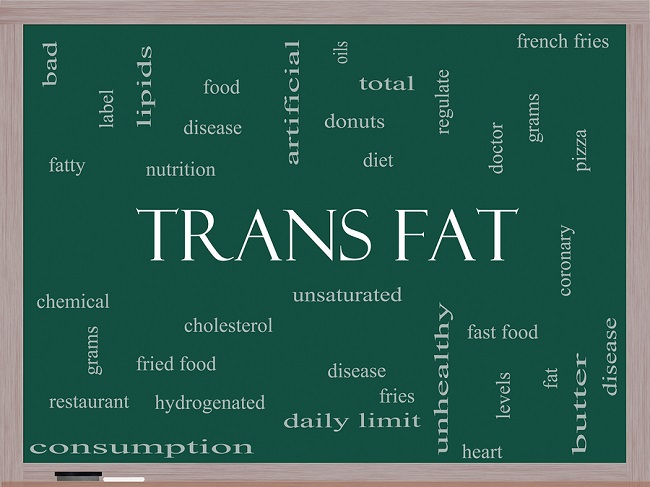- Make It Yourself Lavender Heart-Shaped Bath Bombs!
- 20 Things You Never Knew About “Down There”
- 12 Best Foods For Those Suffering From Arthritis Pain
- 12 Personal Hygiene Mistakes Almost Everyone Makes (Mom Never Told You About #4!)
- 15 Medicinal Plants And Herbs From The Cherokee People
- 12 Mind-Blowing Benefits Of Drinking Coconut Water During Pregnancy
- 12 Outstanding Winter Foods That Won’t Fatten You Up Like A Christmas Turkey
This Type Of Fat Linked To Early Death (So Why Are You Still Eating It?!)

Photo credit: bigstock.com
If you read mainstream news reports, health websites, and listen to your friends talk about what is good for you and what is not, it is easy to get confused.
Everything seems to be “low-fat” but if everyone is eating low-fat, why is everyone fatter than ever before? If fat is bad, why are people eating coconut oil? And butter?
We want to help clear things up a bit for you.
Let’s start with this: All fats are not created equal. Trans-fats are the kind of fats you should be avoiding — not natural, healthy fats like the kind in avocados, nuts, or coconut oil.
The American Heart Association released a report showing that the amount of trans-fats that Americans have been consuming over the past few years has declined, which is good thing, but we are still eating more than we should. Trans-fats are found in processed foods such as pies, cookies, breads, doughnuts, and pastries.
This report found that women were, on average, consuming about 1.7 percent of their total daily calories from trans-fats and men about 1.9 percent. The American Heart Association has said that we should consume a maximum of one percent of our daily calories from trans-fats.
Even the lackadaisical FDA has ordered the food industry to remove trans-fats from foods, calling them a terrible threat to the health of the American people.
As if this were not enough, McMaster University released a study showing that trans-fats are linked to heart disease and early death. This study was published in the British Journal of Medicine.
We have been told for many years that fat is bad for us, but the truth is that trans-fats are what are bad for us. These types of fats have absolutely no health benefits and pose a significant risk of heart disease.
This study looked at 50 different studies regarding saturated fats and trans-fats. The research team did not find any connection between saturated fats and heart disease. It did, however, find that the consumption of trans-fats was linked to a 34 percent increase in early death for any reason, a 28 percent increased risk of dying from heart disease, and a 21 percent increased risk of developing heart disease.
Continue to Page 2

Photo credit: bigstock.com
How do you know if you are eating trans-fats? Look on the label — if it says your product contains partially hydrogenated vegetable oil or hydrogenated vegetable oil, and then you are eating trans-fats.
You will not find hydrogenated fats in butter, eggs, dairy products, or milk. These foods do contain saturated fats, but there have been no studies showing that these types of fats are linked to an increased risk of heart disease.
In June 2015, the Obama administration ordered food companies to begin to phase out these trans-fats over the next three years, since there have been numerous studies showing that processed trans-fat foods go hand in hand with heart disease, heart attack, stroke, and early death.
Australia is also is trying to limit or stop the consumption of trans-fats. The Australian Heart Foundation has been calling for labeling foods that contain trans-fats and phasing out these dangerous types of fats for many years.
SEE ALSO: 12 Dangerous and Toxic Ingredients Still Used by the Golden Arches
Governments around the world have known that trans-fats are harmful to our health by drastically increasing the LDL (bad) cholesterol in the body and lowering the good cholesterol in our blood, which ultimately increases the risk of heart disease, heart attack, stroke, and early mortality.
Trans-fats are made when hydrogen is added to vegetable oils, and these oils are used in food products either as a source of fat , such as using hydrogenated vegetable oil, instead of butter, when making cakes, or by frying foods in them, such as French fries.
The Dietary Guidelines for Americans Committee did not include a recommendation for total fat consumption in the 2015 technical report that was issued, since authors of this paper could not agree on recommendations for saturated fat consumption due to conflicting reports. The authors of this report believe that they will emphasize fat quality, such as consuming more butter and eggs, rather than on total fat consumption.
No matter how you look at it, any new dietary guidelines should carefully consider the health effects of trans-fats and saturated fats in future issues, rather than focus on “fat” as a general subject.
You would be wise to eliminate or remove trans-fats from your diet to avoid the health complications that arise from these types of foods.
References:

































